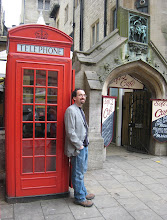At Somerville, and at many of the other colleges of Oxford, the “Dean” is the person in charge of “nonacademic disciplinary matters.” So if a student breaks a window or is an overly obnoxious drunk or is generally causing trouble, they get sent to have a sit-down with the Dean.
Our Dean, Stephen Roberts (and engineering professor), is a pretty nice guy. I’ve heard that so long as a student genuinely appears to regret having done something stupid, they usually don’t get punished too much. Given this reputation, it is a bit surprising that more students have not yet learned the mantra: “Well, at the time it didn’t seem to be so bad.. but in retrospect, I realize that I was completely out of line.”
At lunch a few days ago Dean Roberts told me an extremely interesting statistic about students needing discipline. Of 83 disciplinary incidents this year, only one of these incidents involved a student in the sciences. This is not unique to our college. Apparently all across Oxford the statistics are similar. For those keeping track, History students, Law students, and PPE (Politics, Philosophy, and Economics) students were the people most likely to be troublemakers. Scientists are the least likely to get in trouble.
Why are so few scientists getting into trouble? There are three theories I’ve heard so far (feel free to add your own).
(1) Scientists are just nerdy goody-goodies and don’t do anything that could get them into trouble.
(2) Scientists have too much work and just don’t have any time to do anything that would get them into trouble.
I think both of these could be refuted by going to MIT and noticing that the total nerd culture of MIT certainly does not preclude the possibility of causing unlimited mayhem. Trouble usually is a result of too much partying, and MIT is not a quiet school by these standards. In fact, MIT has ranked in the top list of party schools – higher than almost any other of the elite institutions. In addition MIT students are famous for their Hacking exploits (here are some of the more public trouble they have caused).
There is, of course, a third possibility of why scientists are not getting into trouble
(3) Scientists are doing exactly the same things as non-scientists… but they are just smart enough not to get caught
****
On the topic of demographics, the Oxford University Newspaper, the Cherwell, recently sent around questionnaires to students to ask them about their sex lives. The article is published here. Actually, it is a very badly written article (see the comments below the article) and further it does not give you enough data to try to determine if their findings are statistically significant. Moreover, as with any data from a questionnaire, there are obvious issues about self-selection in who returns the questionnaire, and whether they are telling the truth.
Nonetheless, if we take the article at face value, some possibly interesting facts can be extracted.
One interesting fact is that historians, followed by PPE majors, are having more sex than others. See my above comments about historians and PPE being big troublemakers. Anyone want to comment about whether this is related?
Another interesting fact is that students who identify themselves as homosexual are more likely do well in exams than those who identify themselves as heterosexual. I have no idea why this should be, but probably there is a PhD thesis waiting to be written.
Finally, the article states that students from Somerville College (my college) are having the most sex of any college at Oxford. (Along with New College – “New” in this case means it was founded in 1379). Should we be proud of our standing as the most sexually active college?
In 1957, Charles Kerr, the chancellor of the Univesity of California stated that
"The chancellor's job had come to be defined as providing parking for the faculty, sex for the students, and athletics for the alumni."
Perhaps Somerville is just doing its job better than the other colleges (not sure how our sports teams have been doing this year though). I imagine that our ranking will probably help our recruiting for next year.
Subscribe to:
Post Comments (Atom)

2 comments:
If that is the job of the chancellor, pray tell, what is the job of the professor?
To park?
Post a Comment